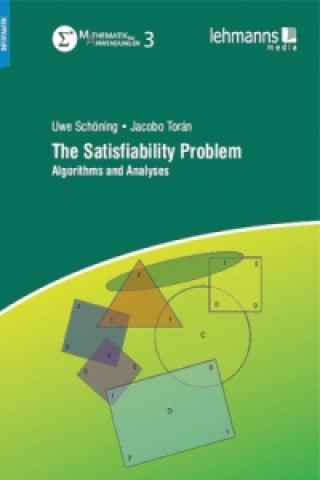
Code: 02109093
The Satisfiability Problem
by Uwe Schöning, Jacobo Torán
The satisfiability problem of propositional logic, SAT for short, is the first algorithmic problem that was shown to be NP-complete, and is the cornerstone of virtually all NP-completeness proofs. The SAT problem consists of decid ... more
- Language:
 English
English - Binding: Paperback
- Number of pages: 184
Publisher: Lehmanns Media, 2013
- More about this

19.17 €
RRP: 20.10 €
You save 0.94 €

In stock at our supplier
Shipping in 3 - 5 days
You might also like
-

Protocol
37.84 € -

Radical History and the Politics of Art
112.03 € -5 % -

History of the Doggett-Daggett Family
53.08 € -4 % -

Fundamental Properties of the Neutron
52.58 € -

Bride in Store
22.40 € -

I Never Thought I'd See You Again
17.45 € -5 % -

Los archivos de The Spirit, 19
34.11 € -10 %
Give this book as a present today
- Order book and choose Gift Order.
- We will send you book gift voucher at once. You can give it out to anyone.
- Book will be send to donee, nothing more to care about.
More about The Satisfiability Problem
You get 48 loyalty points
 Book synopsis
Book synopsis
The satisfiability problem of propositional logic, SAT for short, is the first algorithmic problem that was shown to be NP-complete, and is the cornerstone of virtually all NP-completeness proofs. The SAT problem consists of deciding whether a given Boolean formula has a solution , in the sense of an assignment to the variables making the entire formula to evaluate to true.§Over the last few years very powerful algorithms have been devised being able to solve SAT problems with hundreds of thousands of variables. For difficult (or randomly generated) formulas these algorithms can be compared to the proverbial search for the needle in a haystack. This book explains how such algorithms work, for example, by exploiting the structure of the SAT problem with an appropriate logical calculus, like resolution. But also algorithms based on physical principles are considered.
 Book details
Book details
19.17 €
- Full title: The Satisfiability Problem
- Subtitle: Algorithms and Analyses
- Author: Uwe Schöning, Jacobo Torán
- Language:
 English
English - Binding: Paperback
- Number of pages: 184
- EAN: 9783865415271
- ISBN: 386541527X
- ID: 02109093
- Publisher: Lehmanns Media
- Weight: 454 g
- Dimensions: 240 × 172 × 12 mm
- Date of publishing: 25. September 2013
Trending among others
-

The Book of Bill
23.71 € -14 % -

Gravity Falls Journal 3
16.44 € -23 % -

Berserk Deluxe Volume 1
44.30 € -12 % -

Pumpkin Spice Cafe
11.70 € -18 % -

Berserk Deluxe Volume 2
52.17 € -

White Nights
3.52 € -23 % -

It ends with us
8.67 € -19 % -

48 Laws Of Power
17.96 € -29 % -

Gilmore Girls: The Official Advent Calendar
28.86 € -18 % -

A Little Life
17.45 € -

Atomic Habits
15.94 € -14 % -

Berserk Deluxe Volume 3
48.84 € -2 % -

Jujutsu Kaisen, Vol. 23
11.09 € -15 % -

The 48 Laws of Power
24.52 € -5 % -

Surrounded by Idiots
10.49 € -29 % -

The Official Stardew Valley Cookbook
22.40 € -19 % -

Iron Flame
16.24 € -18 % -

Berserk Deluxe Volume 4
45.21 € -10 % -

A Good Girl's Guide to Murder
8.17 € -14 % -

A Curse For True Love
10.39 € -12 % -

Berserk Deluxe Volume 5
50.46 € -

It Starts with Us
9.07 € -29 % -

Powerless
10.49 € -23 % -

The Husky and His White Cat Shizun: Erha He Ta de Bai Mao Shizun (Novel) Vol. 6
16.14 € -19 % -

Twisted Love
9.78 € -24 % -

Court of Mist and Fury
9.38 € -18 % -

Twisted Hate
10.18 € -20 % -

Chainsaw Man, Vol. 16
11.29 € -13 % -

Psychology of Money
18.87 € -4 % -

Twisted Lies
9.78 € -24 % -

English File: Intermediate: Student's Book with Online Practice
25.63 € -7 % -

Reckless
10.29 € -20 % -

Berserk Deluxe Volume 6
51.17 € -

Gravity Falls: Lost Legends
17.75 € -15 % -

English File Upper Intermediate Student's Book with Student Resource Centre Pack (4th)
44.10 € -4 % -

Headway: Elementary: Student's Book with Online Practice
24.92 € -8 % -

Twisted Games
9.78 € -17 % -

Everything I Know About Love
10.39 € -29 % -

Court of Thorns and Roses Paperback Box Set (5 books)
50.05 € -20 % -

Court of Thorns and Roses
9.28 € -25 % -

Meow
20.78 € -

Vagabond (VIZBIG Edition), Vol. 1
24.52 € -

Headway: Elementary: Workbook Without Key
13.92 € -

Once Upon A Broken Heart
9.88 € -23 % -

The Ballad of Never After
10.08 € -21 % -

SOLO LEVELING V09
17.75 € -15 % -

A Court of Wings and Ruin
10.79 € -6 % -

The Courage To Be Disliked
10.99 € -27 % -

A Court of Silver Flames
10.08 € -15 %
Collection points Bratislava a 2642 dalších
Copyright ©2008-24 najlacnejsie-knihy.sk All rights reservedPrivacyCookies


 15549 collection points
15549 collection points Delivery 2.99 €
Delivery 2.99 € 02/210 210 99 (8-15.30h)
02/210 210 99 (8-15.30h)